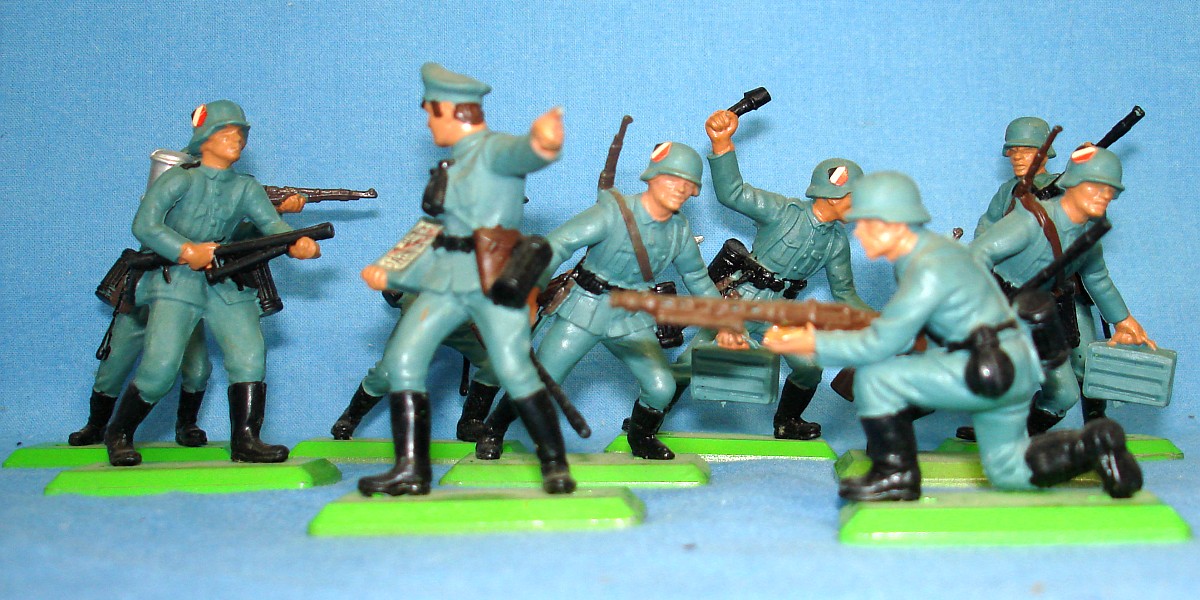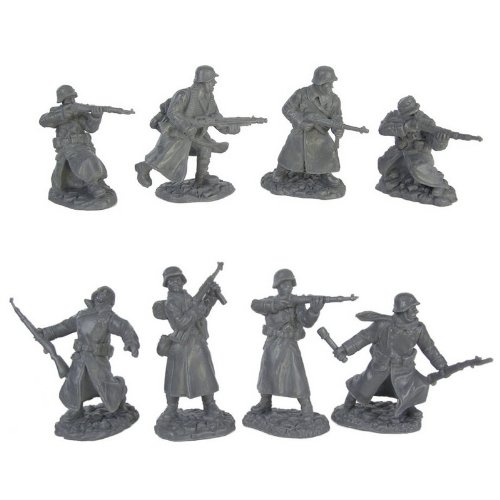Hassel claimed that he was born as Sven Pedersen at Frederiksborg, Zealand, Denmark, and later  adopted his mother's maiden name, Hassel. At the age of 14 he joined the merchant navy as a cabin
adopted his mother's maiden name, Hassel. At the age of 14 he joined the merchant navy as a cabin boy and worked on ships until his military service in 1936. In 1937, to escape the Great Depression,
the unemployed Hassel moved to Germany to join the army. In an
interview in 1990, he said,
boy and worked on ships until his military service in 1936. In 1937, to escape the Great Depression,
the unemployed Hassel moved to Germany to join the army. In an
interview in 1990, he said,  "Germany happened to be closer than England,
I went to a Wehrmacht
recruiting office to enlist, but it wasn't as easy as I had thought.
Only German citizens could serve. After six months of trying to join up,
the Seventh Cavalry Regiment finally accepted me on the condition that I
became a naturalized German."
"Germany happened to be closer than England,
I went to a Wehrmacht
recruiting office to enlist, but it wasn't as easy as I had thought.
Only German citizens could serve. After six months of trying to join up,
the Seventh Cavalry Regiment finally accepted me on the condition that I
became a naturalized German."
Hassel served with the 2nd Panzer Division stationed at Eisenach and in 1939 was a tank driver during the invasion of Poland.A year later he attempted to escape. He served with the 2nd Cavalry Regiment and later the 11th and 27th Panzer Regiments (6th Panzer Division) on all fronts except North Africa and was wounded several times. Eventually he reached the rank of lieutenant and received an Iron Cross 1st and 2nd class. He surrendered to Soviet troops in Berlin in 1945 and spent the following years in various POW camps. He began to write his first book, Legion of the Damned while he was interned.
and in 1939 was a tank driver during the invasion of Poland.A year later he attempted to escape. He served with the 2nd Cavalry Regiment and later the 11th and 27th Panzer Regiments (6th Panzer Division) on all fronts except North Africa and was wounded several times. Eventually he reached the rank of lieutenant and received an Iron Cross 1st and 2nd class. He surrendered to Soviet troops in Berlin in 1945 and spent the following years in various POW camps. He began to write his first book, Legion of the Damned while he was interned.
He was released in 1949 and was planning to join the French Foreign Legion when he met Dorthe Jensen, whom he married in 1951. He went to work in a car factory, but his wife encouraged him to continue to write about his experiences. Legion of the Damned was published in 1953. In 1957 Hassel suffered from an attack of a sickness caught during the war and was paralyzed for almost two years. After recovery, he began to write more books. In 1964 he moved to Barcelona, Spain, where he lived until his death. In total he published 14 novels which have been translated into 18 languages. In 1987 his book Wheels of Terror was made into a film titled The Misfit Brigade.
Wheels of Terror was made into a film titled The Misfit Brigade.
 undesirables. In addition to Sven, they include
Alfred Kalb, "Legionnaire" (ex-member of French Foreign Legion);
Wolfgang Creutzfeldt, a giant of a man ironically named Tiny (variously
Little John in some of the books); barracks fixer and shrewd thief
Joseph Porta; older sergeant Willie Beier, "Old Un" or "Old Man"; Julius
Heide, an ex-Waffen SS officer and Nazi fanatic, Barcelona Blom, a veteran of both sides of the Spanish Civil War,
Gregor Martin, who was a removals man before the war, Chief Mechanic
Wolf, and Staff Sergeant Hoffman, a typical German NCO of the period.
They serve on most fronts from Northern Finland to the Russian Front
(more than once), Italy (Monte Cassino), Greece (The Bloody Road to Death) and the Balkans, and to Normandy (Liquidate Paris) during the Normandy Invasion.
Whilst most of the action appears to occur in Russia, a quick
chronological analysis of the activities described in the books appears
to show that the regiment depicted in the books fought in several
places, hundreds of miles apart, at the same time. In some of the books
the 27th Regiment does guard duty for the Gestapo in Hamburg (Assignment Gestapo) and also at the military prison at Torgau
undesirables. In addition to Sven, they include
Alfred Kalb, "Legionnaire" (ex-member of French Foreign Legion);
Wolfgang Creutzfeldt, a giant of a man ironically named Tiny (variously
Little John in some of the books); barracks fixer and shrewd thief
Joseph Porta; older sergeant Willie Beier, "Old Un" or "Old Man"; Julius
Heide, an ex-Waffen SS officer and Nazi fanatic, Barcelona Blom, a veteran of both sides of the Spanish Civil War,
Gregor Martin, who was a removals man before the war, Chief Mechanic
Wolf, and Staff Sergeant Hoffman, a typical German NCO of the period.
They serve on most fronts from Northern Finland to the Russian Front
(more than once), Italy (Monte Cassino), Greece (The Bloody Road to Death) and the Balkans, and to Normandy (Liquidate Paris) during the Normandy Invasion.
Whilst most of the action appears to occur in Russia, a quick
chronological analysis of the activities described in the books appears
to show that the regiment depicted in the books fought in several
places, hundreds of miles apart, at the same time. In some of the books
the 27th Regiment does guard duty for the Gestapo in Hamburg (Assignment Gestapo) and also at the military prison at Torgau  (March Battalion). Hassel states that the characters are based on real people and events are related to historical events.
(March Battalion). Hassel states that the characters are based on real people and events are related to historical events.
Hassel's view of war is brutal.In his books, soldiers fight only to survive, the Geneva Convention being a dead letter to all sides. People are killed by chance or with very little reason. Occasional pleasant events and peaceful meetings are brutally cut short. Unsympathetic Prussian officers constantly threaten their men with courts-martial and execute them with little provocation. Disgruntled soldiers occasionally kill their own officers to get rid of them. By graphically portraying war as violent and hopeless in such manner, Sven Hassel's books have been said to contain an anti-war message. His first book Legion of the Damned has been compared to a much grislier, darker more terrifying version of Erich Maria Remarque's All Quiet on the Western Front.
While Haaest has been instrumental in casting public doubt on Sven Hassel's stories, they were never taken seriously by military or history professionals to begin with. For example, there was a 27th Panzer Regiment (a part of the 19th Panzer Division), but it was not penal. Tiger I tanks were in short supply, and were organized in special battalions, directly under Corps command, but attached to a few elite divisions; they certainly were not given to any penal formation as shown in Hassel's books.
In 1988 a humorous book called The Book of Revelations (Mark Leigh and Mike Lepine) printed a parody of both Beatrix Potter and Sven Hassel entitled Peter Rabbit - Tank Killer, lampooning the fashion of the period for unscrupulous publishers and literary estates to draft in famous authors to pen "continuations" of their most successful characters and series.
 boy and worked on ships until his military service in 1936. In 1937, to escape the Great Depression,
the unemployed Hassel moved to Germany to join the army. In an
interview in 1990, he said,
boy and worked on ships until his military service in 1936. In 1937, to escape the Great Depression,
the unemployed Hassel moved to Germany to join the army. In an
interview in 1990, he said,  "Germany happened to be closer than England,
I went to a Wehrmacht
recruiting office to enlist, but it wasn't as easy as I had thought.
Only German citizens could serve. After six months of trying to join up,
the Seventh Cavalry Regiment finally accepted me on the condition that I
became a naturalized German."
"Germany happened to be closer than England,
I went to a Wehrmacht
recruiting office to enlist, but it wasn't as easy as I had thought.
Only German citizens could serve. After six months of trying to join up,
the Seventh Cavalry Regiment finally accepted me on the condition that I
became a naturalized German."Hassel served with the 2nd Panzer Division stationed at Eisenach
 and in 1939 was a tank driver during the invasion of Poland.A year later he attempted to escape. He served with the 2nd Cavalry Regiment and later the 11th and 27th Panzer Regiments (6th Panzer Division) on all fronts except North Africa and was wounded several times. Eventually he reached the rank of lieutenant and received an Iron Cross 1st and 2nd class. He surrendered to Soviet troops in Berlin in 1945 and spent the following years in various POW camps. He began to write his first book, Legion of the Damned while he was interned.
and in 1939 was a tank driver during the invasion of Poland.A year later he attempted to escape. He served with the 2nd Cavalry Regiment and later the 11th and 27th Panzer Regiments (6th Panzer Division) on all fronts except North Africa and was wounded several times. Eventually he reached the rank of lieutenant and received an Iron Cross 1st and 2nd class. He surrendered to Soviet troops in Berlin in 1945 and spent the following years in various POW camps. He began to write his first book, Legion of the Damned while he was interned.
He was released in 1949 and was planning to join the French Foreign Legion when he met Dorthe Jensen, whom he married in 1951. He went to work in a car factory, but his wife encouraged him to continue to write about his experiences. Legion of the Damned was published in 1953. In 1957 Hassel suffered from an attack of a sickness caught during the war and was paralyzed for almost two years. After recovery, he began to write more books. In 1964 he moved to Barcelona, Spain, where he lived until his death. In total he published 14 novels which have been translated into 18 languages. In 1987 his book
 Wheels of Terror was made into a film titled The Misfit Brigade.
Wheels of Terror was made into a film titled The Misfit Brigade.
Hassel's books are written in the first person, with Hassel himself as a character, though not necessarily the lead character. The books describe the exploits of a 27th (Penal) Panzer Regiment composed of expendable soldiers - sentenced criminals, court-martialed soldiers and political
 undesirables. In addition to Sven, they include
Alfred Kalb, "Legionnaire" (ex-member of French Foreign Legion);
Wolfgang Creutzfeldt, a giant of a man ironically named Tiny (variously
Little John in some of the books); barracks fixer and shrewd thief
Joseph Porta; older sergeant Willie Beier, "Old Un" or "Old Man"; Julius
Heide, an ex-Waffen SS officer and Nazi fanatic, Barcelona Blom, a veteran of both sides of the Spanish Civil War,
Gregor Martin, who was a removals man before the war, Chief Mechanic
Wolf, and Staff Sergeant Hoffman, a typical German NCO of the period.
They serve on most fronts from Northern Finland to the Russian Front
(more than once), Italy (Monte Cassino), Greece (The Bloody Road to Death) and the Balkans, and to Normandy (Liquidate Paris) during the Normandy Invasion.
Whilst most of the action appears to occur in Russia, a quick
chronological analysis of the activities described in the books appears
to show that the regiment depicted in the books fought in several
places, hundreds of miles apart, at the same time. In some of the books
the 27th Regiment does guard duty for the Gestapo in Hamburg (Assignment Gestapo) and also at the military prison at Torgau
undesirables. In addition to Sven, they include
Alfred Kalb, "Legionnaire" (ex-member of French Foreign Legion);
Wolfgang Creutzfeldt, a giant of a man ironically named Tiny (variously
Little John in some of the books); barracks fixer and shrewd thief
Joseph Porta; older sergeant Willie Beier, "Old Un" or "Old Man"; Julius
Heide, an ex-Waffen SS officer and Nazi fanatic, Barcelona Blom, a veteran of both sides of the Spanish Civil War,
Gregor Martin, who was a removals man before the war, Chief Mechanic
Wolf, and Staff Sergeant Hoffman, a typical German NCO of the period.
They serve on most fronts from Northern Finland to the Russian Front
(more than once), Italy (Monte Cassino), Greece (The Bloody Road to Death) and the Balkans, and to Normandy (Liquidate Paris) during the Normandy Invasion.
Whilst most of the action appears to occur in Russia, a quick
chronological analysis of the activities described in the books appears
to show that the regiment depicted in the books fought in several
places, hundreds of miles apart, at the same time. In some of the books
the 27th Regiment does guard duty for the Gestapo in Hamburg (Assignment Gestapo) and also at the military prison at Torgau  (March Battalion). Hassel states that the characters are based on real people and events are related to historical events.
(March Battalion). Hassel states that the characters are based on real people and events are related to historical events.Hassel's view of war is brutal.In his books, soldiers fight only to survive, the Geneva Convention being a dead letter to all sides. People are killed by chance or with very little reason. Occasional pleasant events and peaceful meetings are brutally cut short. Unsympathetic Prussian officers constantly threaten their men with courts-martial and execute them with little provocation. Disgruntled soldiers occasionally kill their own officers to get rid of them. By graphically portraying war as violent and hopeless in such manner, Sven Hassel's books have been said to contain an anti-war message. His first book Legion of the Damned has been compared to a much grislier, darker more terrifying version of Erich Maria Remarque's All Quiet on the Western Front.
The Danish writer Erik Haaest has been disputing Hassel's claims for many years.Haaest writes that Sven Hassel is actually Børge Villy Redsted Pedersen, a Danish Nazi who never served on the Russian front. According to Haaest, the author spent the majority of World War II in occupied Denmark and his knowledge of warfare comes second-hand from Danish Waffen-SS veterans whom he met after the end of the war. Haaest also alleges that Hassel's first novel was ghostwritten and when it became a success, he employed his wife to write the rest of his books. Haaest claims that during the war period, Pedersen/Hassel, was in fact a member of the HIPO Corps or Hilfspolizei, an auxiliary Danish police force created by the Gestapo, consisting of collaborators. According to Haaest, Pedersen aka Hassel was actually put on trial in Denmark, but avoided a death sentence – a fate that many HIPO members faced. However, Haaest himself became a subject of controversy. In 2007, the Danish Arts Council was criticized for providing funding to Haaest for research into Danes who served in the SS, on the grounds that Haaest had stated that the concentration camp gas chambers never existed and that the Diary of Anne Frank was a forgery.
While Haaest has been instrumental in casting public doubt on Sven Hassel's stories, they were never taken seriously by military or history professionals to begin with. For example, there was a 27th Panzer Regiment (a part of the 19th Panzer Division), but it was not penal. Tiger I tanks were in short supply, and were organized in special battalions, directly under Corps command, but attached to a few elite divisions; they certainly were not given to any penal formation as shown in Hassel's books.
In 1988 a humorous book called The Book of Revelations (Mark Leigh and Mike Lepine) printed a parody of both Beatrix Potter and Sven Hassel entitled Peter Rabbit - Tank Killer, lampooning the fashion of the period for unscrupulous publishers and literary estates to draft in famous authors to pen "continuations" of their most successful characters and series.
 Hassel claimed that he was born as Sven Pedersen at Frederiksborg, Zealand, Denmark, and later
Hassel claimed that he was born as Sven Pedersen at Frederiksborg, Zealand, Denmark, and later
No comments:
Post a Comment